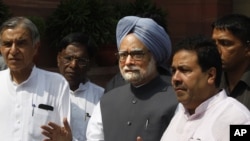NEW DELHI — India’s prime minister has warned that failure to boost economic growth could impact national security. Manmohan Singh promises to improve conditions to reverse the country’s economic slump.
Addressing the nation on Wednesday, Singh said lack of political consensus is holding back efforts to create an environment for rapid economic growth.
He was speaking from the ramparts of the historic Red Fort in New Delhi on the occasion of the 65th anniversary of India’s independence from British rule.
The prime minister says global economic woes are affecting India, but the country also needs to resolve domestic problems to speed up growth.
Singh says the downward trend could also affect national security. He did not elaborate -- but worries are growing that flagging growth is hurting efforts to create new jobs in one of the world’s youngest and most populous countries.
During the past year, opposition parties and Singh’s own political allies, have held back the government from liberalizing the economy. Investment has been plunging.
The prime minister pledged to do everything possible to create better conditions for foreign investors.
He says that to attract foreign capital, India will have to create confidence at the international level that there are no barriers to investment in India.
That could be a signal that the government will press ahead with contentious economic reforms such as opening up the retail sector to foreign investors, which were blocked both by opposition parties and Singh’s own allies.
Singh expressed optimism that India’s economic woes will be brief, and that the economy will expand at a brisker pace compared to last year’s 6.5 percent growth rate. He says ambitious measures to accelerate infrastructure development and add new roads, railways and ports will boost growth.
The prime minister also called on political parties to pass legislation to reduce corruption and make the government more accountable. Civil society movements in the past year have pressed for a tough law to punish graft, but the measure has not yet received parliament’s approval. That has raised public discontent.
Singh’s government was re-elected three-and-a-half years ago. But in the past year the prime minister -- a well known economist -- has faced widespread criticism for allowing the economy to drift. Although he has a reputation for personal honesty, he has also been blamed for not doing enough to control corruption. Political analysts say both issues will get greater prominence as the country prepares for the 2014 general elections.
Addressing the nation on Wednesday, Singh said lack of political consensus is holding back efforts to create an environment for rapid economic growth.
He was speaking from the ramparts of the historic Red Fort in New Delhi on the occasion of the 65th anniversary of India’s independence from British rule.
The prime minister says global economic woes are affecting India, but the country also needs to resolve domestic problems to speed up growth.
Singh says the downward trend could also affect national security. He did not elaborate -- but worries are growing that flagging growth is hurting efforts to create new jobs in one of the world’s youngest and most populous countries.
During the past year, opposition parties and Singh’s own political allies, have held back the government from liberalizing the economy. Investment has been plunging.
The prime minister pledged to do everything possible to create better conditions for foreign investors.
He says that to attract foreign capital, India will have to create confidence at the international level that there are no barriers to investment in India.
That could be a signal that the government will press ahead with contentious economic reforms such as opening up the retail sector to foreign investors, which were blocked both by opposition parties and Singh’s own allies.
Singh expressed optimism that India’s economic woes will be brief, and that the economy will expand at a brisker pace compared to last year’s 6.5 percent growth rate. He says ambitious measures to accelerate infrastructure development and add new roads, railways and ports will boost growth.
The prime minister also called on political parties to pass legislation to reduce corruption and make the government more accountable. Civil society movements in the past year have pressed for a tough law to punish graft, but the measure has not yet received parliament’s approval. That has raised public discontent.
Singh’s government was re-elected three-and-a-half years ago. But in the past year the prime minister -- a well known economist -- has faced widespread criticism for allowing the economy to drift. Although he has a reputation for personal honesty, he has also been blamed for not doing enough to control corruption. Political analysts say both issues will get greater prominence as the country prepares for the 2014 general elections.




